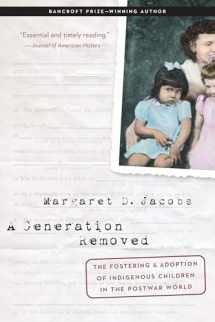
A Generation Removed: The Fostering and Adoption of Indigenous Children in the Postwar World
Book details
Summary
Description
On June 25, 2013, the U.S. Supreme Court heard the case Adoptive Couple vs. Baby Girl, which pitted adoptive parents Matt and Melanie Capobianco against baby Veronica’s biological father, Dusten Brown, a citizen of the Cherokee Nation of Oklahoma. Veronica’s biological mother had relinquished her for adoption to the Capobiancos without Brown’s consent. Although Brown regained custody of his daughter using the Indian Child Welfare Act (ICWA) of 1978, the Supreme Court ruled in favor of the Capobiancos, rejecting the purpose of the ICWA and ignoring the long history of removing Indigenous children from their families.
In A Generation Removed, a powerful blend of history and family stories, award-winning historian Margaret D. Jacobs examines how government authorities in the post–World War II era removed thousands of American Indian children from their families and placed them in non-Indian foster or adoptive families. By the late 1960s an estimated 25 to 35 percent of Indian children had been separated from their families.
Jacobs also reveals the global dimensions of the phenomenon: these practices undermined Indigenous families and their communities in Canada and Australia as well. Jacobs recounts both the trauma and resilience of Indigenous families as they struggled to reclaim the care of their children, leading to the ICWA in the United States and to national investigations, landmark apologies, and redress in Australia and Canada.


We would LOVE it if you could help us and other readers by reviewing the book
Book review



